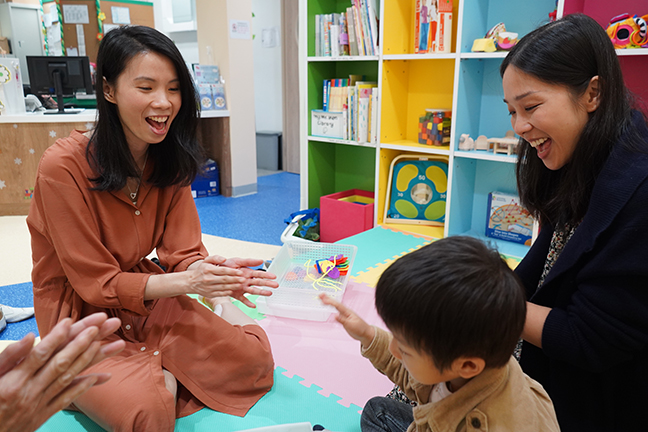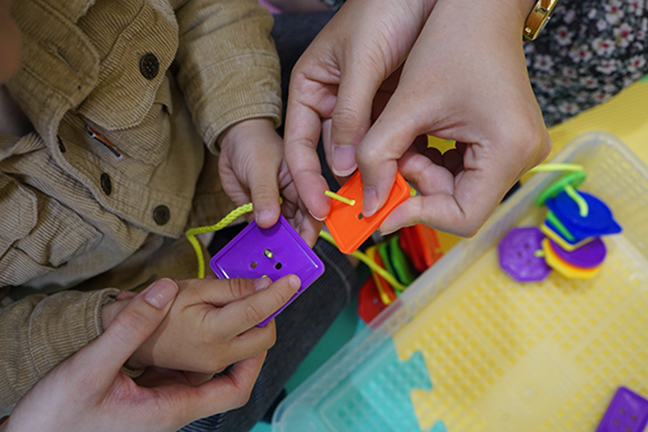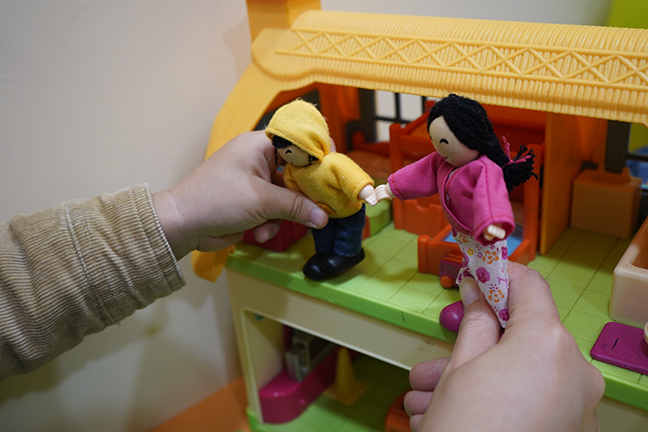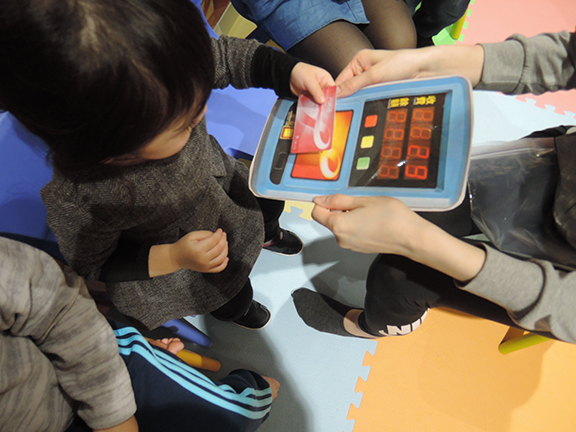Story
Enjoying a different growing path
Even after turning two years old, Hei-hei (alias) was still not able to talk. He was unstable with eruptive emotions, for example, he would throw himself on the floor crying whenever his needs were not satisfied by the grown-ups, and that left his parents, Mr and Mrs Wong, baffled. It was only after a check-up with the doctor they found that Hei-hei was weak in his expressive language. Upon assessment, Hei-hei was diagnosed with developmental delays, being a little behind his same-age peers in intellectual and fine motor development as well as language ability. Gladly, Hei-hei’s parents found The Salvation Army SKY Family and Child Development Centre (SKY) when they searched for information on ‘Special Educational Needs’ on the internet, making it possible for Hei-hei to receive timely treatment during the critical period of child development.
Identifying ‘special needs’
Mr and Mrs Wong are both working parents. It is never easy to strike a balance between work and family, so they could only entrust Hei-hei’s care to his grandmother. The doctor’s diagnosis obviously affected the entire family. Mr and Mrs Wong, being parents, could not help but blame themselves. ‘I always reflect on why my son has this condition, whether it was because I spent too little time with him, or I was so swamped with my work that we had too few family activities,’ said Mrs Wong. Watching her cheerful and energetic grandson, Grandma could not understand why he would be ‘so special’. She always secretly compared Hei-hei to other children of similar age and found it hard to accept that he was falling behind. Mr and Mrs Wong spent lots of time searching for information and followed the doctor’s advice to find suitable treatments for Hei-hei. The mystery of this ‘special’ condition was finally solved when they found The Salvation Army.
Hei-hei used to point at the things he wanted with his fingers, or to use unintelligible sounds to express his needs. He did not realise that he could communicate by means of ‘talking’. During the first three months at SKY, the social worker first talked to Mrs Wong to learn about Hei-hei’s development and family background, followed by a detailed assessment on Hei-hei across different developmental domains. Then, suitable pieces of training tailored to his needs were arranged, and learning goals were set. During the lessons from Monday to Friday, our special child care worker, social worker and therapist patiently trained up Hei-hei to follow instructions and used teaching tools such as flashcards to ‘get him talking’. Now, when Hei-hei wants to find his favourite toy, he can clearly say the words ‘want red car’ and when he wants to reject, he will say ‘No’. These seemingly trivial changes are indeed huge encouragement to the parents and it is most comforting for the family to see Hei-hei finally manage to control his emotions and stop forcing the grown-ups to get him what he wants by being cranky and losing temper.
The first step to face up the problem
Parents’ emotions are triggered naturally with whatever situations their children are in. It is not easy to face it squarely when one’s child has special needs. Knowing well that a healthy family can create a good environment for a child’s growth, The Salvation Army services while serving children with special needs, also give support to their families. Chan Wing-sze, special child care worker of SKY, points out, ‘Our Centre provides family-oriented services. Beside direct training for the children, we also provide home assistance to parents of dual-career families just like Mr and Mrs Wong's, equipping them with skills to give training to their children at home. We also maintain close communication with these parents by meeting up regularly, and organise various activities for them to participate during their free time.’
Having this special kid at home, the Wong’s family has turned from feeling confused to being open and courageous with the challenge. This change of attitude has been crucial to Hei-hei’s changes and development. ‘When you find your child has some special needs, giving them training is, of course, necessary, but the parents’ attitude matters even more. Having special learning needs is never something to be ashamed of. If parents refuse to let their children receive suitable help just for face-saving, it will only delay their children’s development,’ said Mrs Wong. Just like Hei-hei, every child with special needs is unique. Parents’ assurance, presence and company are definitely irreplaceable support for their children. As Chan Wing-sze encouraged parents, ‘Staying calm and emotionally healthy can promote positive family interaction and a consistent parenting style established by all family members is also helpful.’
Supports emotional health and enhances parent-child communication
In addition to the sensory integration room, speech therapy room, psychological counselling room and small group activity room, SKY specially sets up ‘Soul Oasis’, an area that acts as a charging station for parents, allowing them to take a rest or have some quiet time to settle or release their emotions. Self-help and healing books are available there for parents, and social workers may also step in to provide counselling to help when necessary. To help strengthen the parent-child relationship, game workshops are organised by clinical psychologists of the Centre for families to share happy moments together, allowing parents to understand their children better and promoting the children’s emotional health.
The Salvation Army SKY Family and Child Development Centre
Established in 2013, the Centre expanded its services and set up a new branch in Mongkok last year. The Centre is named SKY, an abbreviation for ‘Special Keys for You’. The SKY service team hopes to help each family to find the ‘key’ to open the ‘door of hope' and embrace the challenges in lives. The SKY team of professionals provides comprehensive services including assessment, training and family support services to children with special needs and their families, aiming to help families better function and enjoy a qualifying life.









